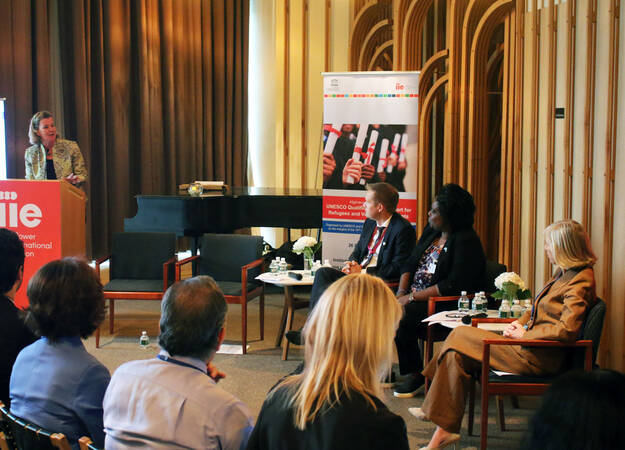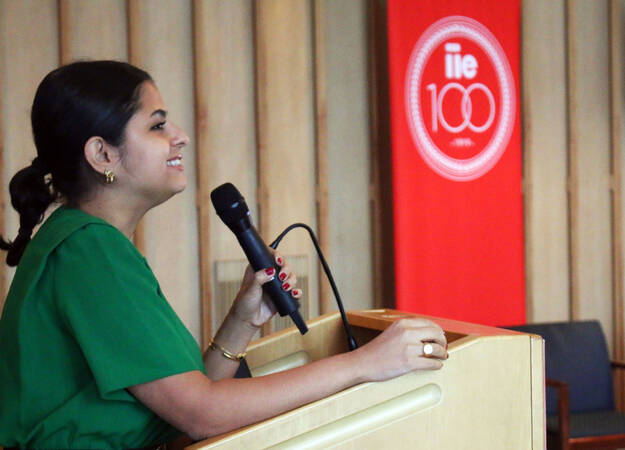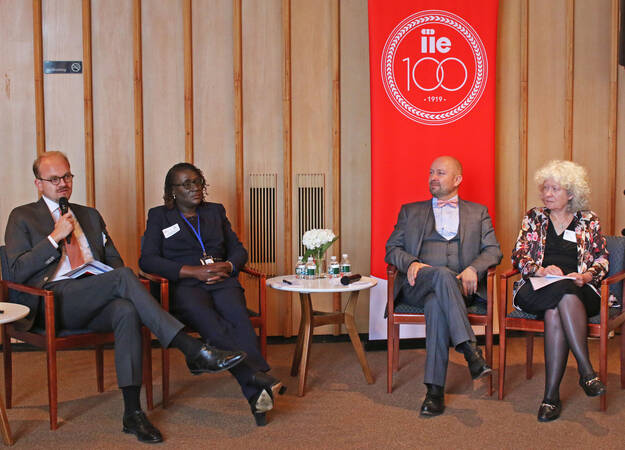With the United Nations 74th General Assembly in full swing across the street from the Institute of International Education's (IIE) NYC headquarters, the IIE office was the ideal setting for the unveiling UNESCO's new Qualifications Passport. As attendees from all sectors began to arrive on September 26 for the High-Level Event on the UNESCO Qualifications Passport for Refugees and Vulnerable Migrants, away from the sirens and security, one could hear the excitement surrounding this innovative and important tool for vulnerable migrant and refugee students.
"We were founded with the hope and belief that international exchange in education could bring people together, to transcend differences and borders," said Maxmillian Angerholzer III, Executive Vice President of the Institute of International Education during his opening remarks, affirming why IIE was the right place to launch this initiative.
The afternoon's topic was brought to light by Stefania Giannini, Assistant Director General for Education at UNESCO, in her opening address: "Giving universities a concrete tool to verify and accept refugee students' qualifications is very important." Almost instantaneously, the quiet was ousted by a series of excited murmurs, as this is a challenge university professionals and credential evaluators are facing with no clear solution in sight.

H.E Aksel Jakobsen, State Secretary for International Development in Norway, one of the keynote speakers, urged the audience to realize that "at the moment, we are wasting a lot of talent by not acknowledging refugee and migrant qualifications." United Nations Deputy High Commissioner for Refugees, Kelly T. Clements, reinforced Jakobsen's statement, explaining how the absence of recognized qualifications affects refugee and migrant students.
"There is nothing more valuable than an education." - Kelly T. Clements, United Nations Deputy High Commissioner for Refugees.
Throughout the afternoon, seven high-level speakers gave short statement speeches emphasizing their support for the Qualifications Passport, the importance of this initiative, and how they believe the Qualifications Passport will empower students who were forced to leave their home countries without having their proper academic documentation. I found this to be an intriguing way of informing the audience of the well-rounded support this initiative has, and why even more investment is needed.
"We need to invest in migrant students at any age. Don't ask me to prioritize within education, because we need to support all levels of education." - Jaime Saavedra , Global Director Education, World Bank.
After a short networking break, Maxmillian Angerholzer III presented Sana Mustafa, founder of Sana Mustafa Consulting LLC and co-founder of the Network for Refugee Voices, with an IIE Centennial Medal. To celebrate IIE's 100th anniversary year, IIE is conferring Centennial Medals to organizations and individuals who have contributed to the field of international education.
"Nothing about us without us." - Sana Mustafa, Founder of Sana Mustafa Consulting LLC and Co-Founder of the Network for Refugee Voices.

Upon accepting her award, Sana gave an inspirational speech, sharing with the audience how education, and specifically international education, has impacted her life. Sana also went on to emphasize how important it is to include refugee voices in the conversation when designing policies and programs that directly affect them. This statement attracted several nods across the audience, agreeing that refugee voices are rarely represented when debating and discussing policies and programs for refugee populations.

As the clock struck 5:00, it was time for the expert session of the afternoon, discussing how the Qualifications Passport works in real life and has impacted the life of refugee and migrant students. Andreas Snildal, Program Specialist at UNESCO, moderated a panel which included Stig Arne Skjerven, Director Department of Foreign Education at the Norwegian Agency for Quality Assurance in Education (NOKUT), Mirriam Chiyaba, Chief Executive Officer of the Zambia Qualifications Authority, and Ita Sheehy, Senior Education Officer at the United Nations High Commissioner for Refugees (UNHCR).
The UNESCO Qualifications Passport pilot was recently launched in Zambia, in collaboration with the UNHCR and NOKUT. The panel highlighted the methodology behind the Qualifications Passport and how it benefits the passport holder.
Stig Arne Skjerven reiterated that the main goal of the Qualifications Passport is to "not only recognize a student's degree, but to provide them with an opportunity to speak and define their goals and ambitions, which is crucial when building self-reliance."
The event came to a close with an interactive art installation, designed by Artolution, a community-based public art organization that seeks to ignite positive social change through collaborative art making.
As Esther Benjamin, Chief Executive Officer of World Education Services said in her statement speech, "the launch of the UNESCO Qualifications Passport for at risk migrants and refugees is a major milestone in providing refugee and displaced students with higher education." Helping refugee students resume their higher education will not only unveil hidden talent to the world but will also give new perspectives and ideas to conversations that these populations have previously been left out of.
Written by Krikor Yeretzian, Global Education in Emergencies Analyst, IIE
Published on September 30, 2019

